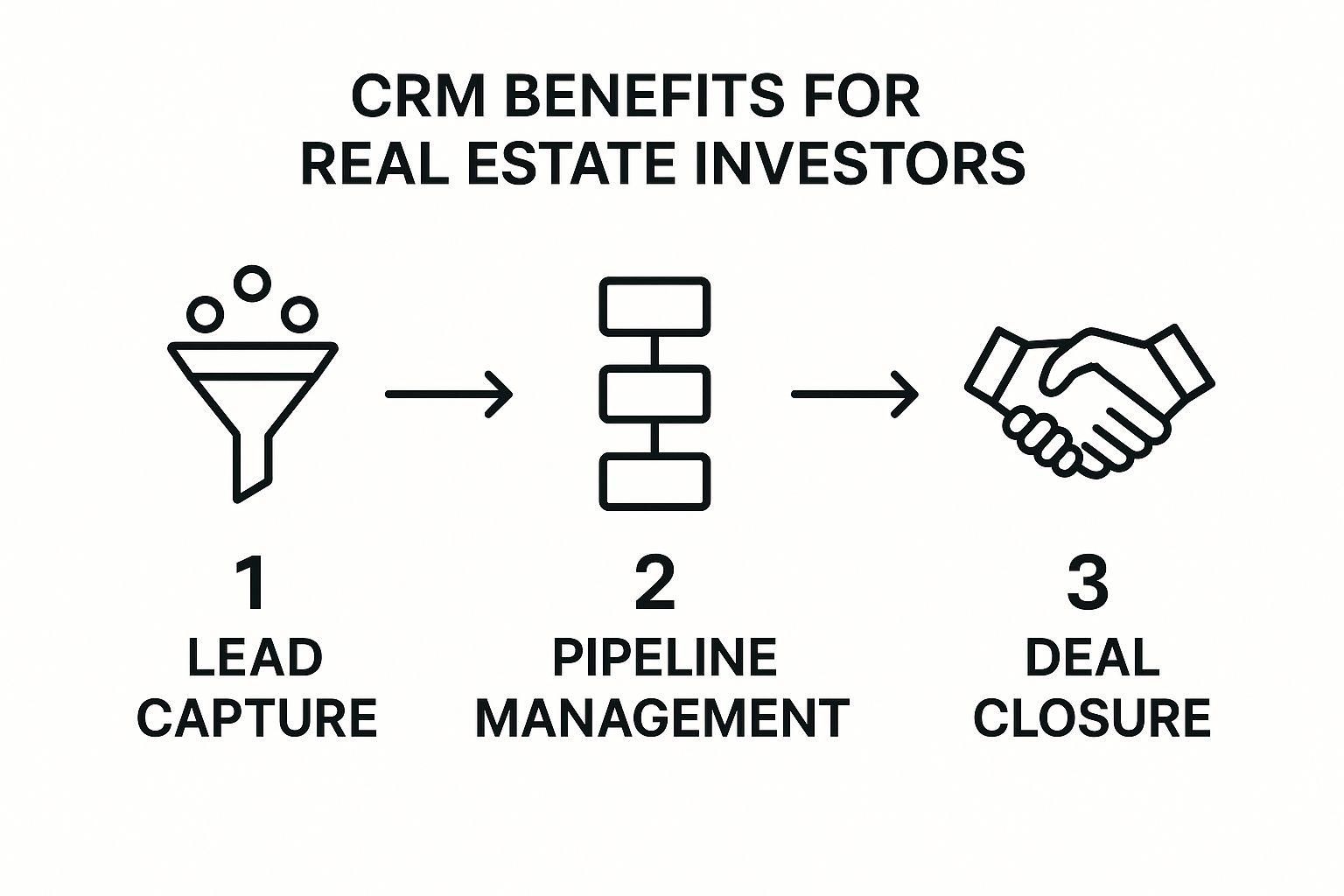CRM for Real Estate Investors: The Ultimate Guide to Boost Your Success
CRM for Real Estate Investors: The Ultimate Guide to Boost Your Success
Discover how a CRM for real estate investors can streamline your deals, manage your leads, and grow your investment portfolio effectively. Learn more now!
Domingo Valadez
Sep 12, 2025
Blog
If you've ever tried to manage your real estate deals with a generic CRM, you know the frustration. It’s like trying to fix a high-performance engine with a standard home toolbox—you might have a hammer and a screwdriver, but you're missing the specialized instruments you actually need to get the job done right.
Standard CRMs are built for a completely different world. They're designed for traditional sales reps, not for real estate investors who are juggling properties, deals, and a web of complex relationships all at once. This mismatch isn't just a minor annoyance; it's actively costing you opportunities and slowing down your growth.
Why Your Old CRM Is Costing You Deals

When you use a standard CRM, you’re essentially forcing a system made for selling widgets to manage your motivated seller leads and property acquisitions. It’s a workaround from the very beginning. These generic platforms are almost always contact-centric, which means every single entry has to be a person or a company. For an investor, that core design flaw creates immediate and constant problems.
You end up fighting the software just to do the simplest things, wasting precious time that you should be spending finding and closing deals.
Common Pains of a Generic CRM
Investors trying to shoehorn their business into a conventional CRM almost always run into the same brick walls. It’s a familiar story of frustration.
- Property Tracking Issues: You're stuck creating fake "contacts" for each property. This clutters up your database and makes it nearly impossible to cleanly link multiple sellers, buyers, or team members to a single address. It’s a data nightmare.
- Inflexible Sales Pipelines: The typical sales pipeline—"Qualified," "Proposal Sent," "Negotiation"—just doesn't fit an investor's deal flow. You need stages like "Initial Research," "Property Analysis," "Offer Made," and "Under Contract."
- Lack of Specialized Fields: Where do you put the critical numbers? After Repair Value (ARV), estimated repair costs, or zoning information have no natural home. Generic CRMs simply weren't built with the fields you need for proper deal analysis.
The core issue is simple: a generic CRM forces you to adapt your investment process to its limitations. A purpose-built CRM for real estate investors adapts to your process, giving you the specialized tools you need to scale.
Ultimately, these daily struggles lead to missed follow-ups, disorganized data, and deals slipping through the cracks. Moving to a system built for investors isn't just an upgrade; it’s a foundational shift from administrative chaos to an organized, scalable operation.
How a Real Estate Investor CRM Works
Think of a specialized CRM not as a fancy address book, but as the central command center for your entire deal-finding operation. It’s a huge leap from a simple contact list. Instead, it organizes everything—people, properties, potential deals, and every text or email—into one interconnected system. This gives you a single, reliable source of truth for your entire business.
Forget about wrestling with chaotic spreadsheets and sticky notes scattered across your desk. In a CRM, every single piece of information has a home. A property's address is directly linked to the seller's contact info, your complete communication history, any uploaded documents, and its exact status in your deal pipeline. This structure is what turns random data into intelligence you can actually use.
This image gives you a simplified look at how a CRM can take a raw lead and turn it into a closed deal.

As you can see, a structured system provides a clear, repeatable path from that first point of contact all the way to a profitable outcome. It effectively removes the guesswork from your process.
Tracing a Deal Through the Pipeline
Let's walk through a common scenario to make this concrete. Imagine a motivated seller lead pops up from your website.
- Lead Capture: The moment they hit submit, their information is automatically pulled into the CRM. A brand-new deal card instantly appears in the first stage of your pipeline, which you might label "New Lead." No manual entry needed.
- Automated Nurturing: The system can then trigger a pre-written email or text sequence to that seller, confirming you got their info and will be in touch shortly. This ensures an immediate, professional follow-up, even if you’re out inspecting another property.
- Moving Through Stages: As you connect with the seller, analyze the property, and make an offer, you just drag and drop their deal card to the next stage—"Contact Made," "Property Analysis," "Offer Sent." Each move can trigger new automated tasks, like a reminder to follow up on your offer in two days.
A deal pipeline gives you complete visibility into your business. You can see at a glance exactly how many potential deals you're juggling, what stage each one is in, and what you need to do next to push them forward.
This kind of structured process makes sure no valuable opportunity ever gets lost in the shuffle. A good CRM for investors brings everything together—profiles for property owners, realtors, and wholesalers—to help you manage relationships and track every deal with real-time updates.
Beyond deal tracking, a real estate investor CRM is a powerhouse for streamlining your day-to-day operations. It can be a massive help with things like efficient real estate appointment scheduling, integrating directly with your calendar to book property viewings or calls with sellers without all the frustrating back-and-forth. It turns chaotic follow-ups into a predictable, reliable system for closing more deals.
The Must-Have Features for Every Investor CRM

Not all CRM platforms are built the same, especially when your world revolves around finding, analyzing, and closing real estate deals. A generic CRM can handle a list of names and numbers, sure. But a true CRM for real estate investors is a specialized toolkit, a command center designed for your specific workflow.
These are the features that separate a game-changing system from a glorified digital spreadsheet. Think of this as your blueprint for evaluating any platform. These are the core functions that will directly lead to more efficiency, better organization, and ultimately, more deals closed.
Intelligent Lead and Property Management
The bedrock of any great investor CRM is how it handles properties. It needs to be property-centric, not just contact-centric. This is a crucial distinction. It means you can create a detailed file for a specific address—say, 123 Main Street—and then link all the associated people to it: the seller, their agent, your attorney, the go-to contractor.
This one feature prevents the data chaos that’s so common when trying to force a generic CRM to work for real estate. Beyond that, a top-tier system will give you:
- Advanced Filtering and Sorting: The power to instantly pull up properties based on zip code, deal status ("Offer Sent," "Needs Follow-Up"), or any custom tag you can dream up.
- Lead Scoring: The system should act like a smart assistant, automatically flagging your most motivated sellers based on their responses and engagement.
- Duplicate Management: A clean database is a profitable database. The CRM should be smart enough to spot and merge duplicate property or contact entries, keeping your information reliable.
With this kind of organization, you always have the complete story for every potential deal right at your fingertips.
A solid CRM becomes the central nervous system for an investor's operations. It’s where raw data—leads, property details, communication logs—gets transformed into actionable intelligence. The table below breaks down the essential features and explains exactly why they're non-negotiable for anyone serious about scaling their real estate investing business.
Ultimately, these aren't just "nice-to-have" bells and whistles; they are the foundational tools that give you a competitive edge. They allow you to manage more leads, follow up more consistently, and close more deals with less manual work.
Visual Deal Pipeline and Task Automation
Seeing your entire business on one screen is a massive advantage. A visual pipeline, often looking like a Kanban board, lets you track every single opportunity as you move it through your custom stages—from "New Lead" to "Under Contract" and finally, "Closed."
The power of a visual pipeline lies in its simplicity. It instantly shows you where every deal stands, highlights bottlenecks in your process, and clarifies which tasks need your immediate attention to move forward.
This visual command center gets a serious boost from task automation. When you drag a deal from one stage to the next, the CRM can automatically set things in motion. For example, moving a deal to "Offer Sent" could instantly create a task reminding you to follow up in 48 hours. This kind of automation is your safety net, making sure critical deadlines and follow-ups are never missed.
Robust Communication and Marketing Tools
In this business, your follow-up game is directly tied to your closing rate. A powerful CRM for real estate investors brings all your communication channels under one roof. We're talking integrated email, SMS, and even a power dialer built right into the platform.
Having these tools inside the CRM means you can text a seller or email an agent without ever leaving the property record, and every one of those interactions is automatically logged. For even broader reach, look for a CRM with WhatsApp integration to connect with people on the platforms they use every day. Add in marketing automation—the ability to build multi-step drip campaigns—and you have a system that nurtures leads for you, keeping your business top-of-mind until they're ready to make a move.
Calculating the True ROI of Your CRM
It's easy to look at a CRM subscription as just another monthly bill, but that's a huge mistake. A specialized real estate CRM isn't a cost center; it's arguably your most powerful revenue-generating asset. That monthly fee is an investment, and like any good investment, it should deliver a real, tangible return by boosting your deal flow, making you more efficient, and ultimately, fattening your bottom line.
The financial upside isn't some vague, abstract concept. We're talking about concrete results that show up in your bank account, and they come from improving three specific areas of your business: closing more deals, converting more leads, and saving an enormous amount of time.
Boosting Deal Volume and Conversions
A system always beats guesswork. A good CRM gives you a system to nurture more leads at once without letting quality slip. You can set up automated follow-ups and drip campaigns that keep your name in front of potential sellers, making sure you're the first person they think of when they're finally ready to make a move. This consistent, systematic nurturing naturally leads to more conversations and, you guessed it, more deals.
In this business, simply not missing a follow-up is a superpower. When a CRM automatically flags a lead for a check-in or pings you with a reminder to call a seller back, your conversion rate can't help but go up. You stop losing deals simply because you got busy and forgot.
Think of it this way: a CRM transforms your deal pipeline from a leaky bucket into a high-pressure hose. You capture more opportunities at the start and push a higher percentage of them through to a profitable close.
This isn't just a hunch; the numbers are pretty clear. A well-implemented CRM can have a massive impact on your business. Studies show these platforms can boost sales by up to 29%, increase team productivity by 34%, and improve the accuracy of sales forecasting by a whopping 40%. The average return on investment? A stunning $8.71 for every dollar spent. That makes it one of the most profitable tools you can have. You can dig into more of these numbers by checking out the full report on real estate CRM statistics.
From Spreadsheet Chaos to Predictable Profit
Picture a small two-person investment team. Before they got a CRM, their world was a chaotic mess of spreadsheets, sticky notes, and inboxes that were constantly overflowing. They were burning hours every week just trying to update lead lists and remember who to call back. They knew deals were slipping through the cracks, but they had no idea where the leaks were.
Then, they implemented a CRM, and everything changed.
- Before: Leads from their website would just sit in an inbox until someone had the time to manually copy and paste them into a spreadsheet.
- After: New leads are now captured automatically, assigned a status, and dropped right into the first stage of their visual deal pipeline.
- Before: Follow-ups were totally random, based on who they happened to remember. During a busy week, "random" usually meant "never."
- After: The moment a deal is moved to "Offer Sent," an automated task is created reminding them to follow up in exactly two days.
This simple shift from reactive chaos to proactive, system-driven work led to them closing two extra deals in their very first quarter. That’s a direct, measurable ROI that paid for their CRM subscription for years to come.
How to Choose the Right CRM for Your Business

Here’s the thing about choosing the "best" CRM for real estate investors: there isn't one. The right choice is all about finding the platform that slots perfectly into your specific business strategy. What’s an absolute powerhouse for a high-volume wholesaling team could feel like an overpriced, clunky mess for a buy-and-hold investor.
Your first step has nothing to do with software. It's about taking a hard look at your own operations. Before you even think about scheduling a demo, you need to be crystal clear on your investment model and daily workflow. This internal audit is what separates the must-have features from the nice-to-have distractions.
Aligning Features with Your Strategy
Think of your investment niche as the primary filter. Each strategy has its own rhythm and unique set of demands, and the right CRM will feel like it was built just for that purpose.
- For Wholesalers: You’re in a game of speed and volume. Your CRM needs to be a lead-generation machine with a powerful dialer and slick marketing automation. The goal is to connect with hundreds of potential sellers quickly and keep the conversations going.
- For Fix-and-Flip Investors: Your world revolves around project management. Look for a CRM that can track rehab budgets, organize contractor communication, and keep your renovation timelines and tasks from spiraling out of control.
- For Buy-and-Hold Investors: You're playing the long game, focusing on relationships and asset performance. The most valuable CRM for you will be one that helps with tenant communication, tracks rental income, and simplifies property maintenance requests.
Getting this alignment right from the start means you won't end up paying for a bunch of fancy features you'll never touch. If you want to go deeper on this, check out our guide on how to choose and utilize a CRM for real estate investing.
Critical Questions to Ask During Demos
Once you’ve narrowed your list down to a few contenders, it’s demo time. This is your chance to cut through the sales pitch and see how the platform actually performs under pressure.
The goal of a demo isn't just to see what a CRM can do, but to figure out what it can do for you. Come prepared with specific, scenario-based questions that reflect your real-world challenges.
Here are a few essential questions to get you started:
- Lead Source Integration: How seamlessly does your system connect with my lead sources? Can it pull from my website, Zillow, and third-party data providers without a headache?
- Pipeline Customization: My acquisition process is unique. Can I customize the deal stages to match exactly how we move a lead from initial contact to a closed deal?
- Mobile Accessibility: Show me the mobile app. Can my team update deals, make calls, and send messages from the field with full functionality? Or is it a watered-down version of the desktop app?
- Scalability and Support: What happens when my team doubles in size? How does the pricing change? What level of customer support is included, and what’s the real-world response time when something breaks?
The answers to these questions will reveal whether a platform can truly support your growth. After all, 54% of sales professionals rely on their CRM to build stronger relationships with buyers. And with over 98% of users rating features like contact management and pipeline tracking as critical, you can’t afford to get this decision wrong.
Setting Up Your CRM for Maximum Impact
Look, a top-tier CRM for real estate investors is a game-changer, but only if you set it up right. A rushed, unplanned implementation is the fastest way to turn a powerful tool into another forgotten subscription gathering digital dust. Your goal from day one should be to build a system that works for you now and grows with you later.
It all starts with your data. Seriously. If you import a messy contact list, you'll have a messy, unreliable CRM. Take the time to clean house first—get rid of duplicate entries, fix inconsistent formatting, and make sure everything is up to date before you even think about uploading.
Building Your Deal Flow Foundation
With clean contacts ready to go, the next move is to map out your deal pipeline. This is more than just creating a few labels; you're building a visual roadmap of your entire acquisition process.
- Define Your Stages: Think through every single step a potential deal takes. This could be anything from “New Lead” and “Initial Research” all the way to “Offer Sent” and “Under Contract.” Get specific and make the stages reflect how you actually work.
- Establish Clear Rules: Create simple, non-negotiable rules for moving deals forward. For example, a deal can’t be moved to the “Property Analysis” stage until key property details are filled in. No exceptions.
This kind of structure keeps everyone on the same page and gives you a bird's-eye view of your entire operation in a single glance.
Driving Team Adoption and Data Integrity
Even the best CRM is useless if your team doesn't use it consistently. The key to getting everyone on board is to make the system dead simple to use and show them its value right away. Set clear, easy-to-follow guidelines for entering data and make it a rule: all updates on a deal happen in the CRM, not in random emails or hallway conversations.
A CRM’s long-term value is directly tied to the quality of the data within it. Clean, consistent data turns your CRM from a simple database into an intelligent tool that helps you make smarter investment decisions.
When you're getting things set up, following essential data management best practices is crucial for the system's long-term health and your ability to really use your data. A little discipline upfront saves you from massive headaches down the road and ensures your CRM starts making an impact immediately.
Common Questions from Real Estate Investors
Jumping into the world of CRMs can feel a bit overwhelming, and it's natural to have a few questions. Let's tackle some of the most common ones we hear from investors just like you.
Can I Get by With a Generic CRM?
You could, but I wouldn't recommend it. A generic system like Salesforce or HubSpot is designed around contacts, not properties. This fundamental difference means you’ll be wrestling with the software constantly, trying to force it to do things it wasn't built for, like tracking property details, comps, and deal flow.
A dedicated CRM for real estate investors is built from the ground up for your specific workflow. It thinks about business the way you do, saving you a ton of headaches and money on custom workarounds.
What's a Realistic Budget for a Real Estate CRM?
The price tag can really vary depending on what you need. For solo investors or small teams just getting started, you're likely looking at a range of $50 to $150 per month.
If you're scaling up and need more horsepower—things like built-in power dialers, sophisticated marketing automation, or tools for managing a larger team—you can expect to invest anywhere from $200 to over $500 per month.
Don't just look at the monthly cost. Think about the return on that investment. How much is your time worth? A good CRM should save you hours of admin work and, most importantly, help you close more deals. That's where the real value is.
If I Could Only Have One Feature, What Should It Be?
Hands down, the single most important feature for most investors is a visual and highly customizable deal pipeline. There is absolutely no substitute for being able to see all of your deals, at every stage, on a single screen.
This kind of clarity is a game-changer. It immediately shows you where your focus needs to be, helps you spot bottlenecks in your process, and ensures a promising lead never gets forgotten and falls through the cracks.
Ready to manage your real estate deals and investors with a system built for growth? Homebase offers an all-in-one platform to streamline your fundraising, investor relations, and deal management. Explore how Homebase can help you scale your business today.
Share On Linkedin
Share On Twitter
Share On Linkedin
Share On Twitter
DOMINGO VALADEZ is the co-founder at Homebase and a former product strategy manager at Google.
What To Read Next
A Guide to Real Estate Financial Modelling for Syndicators
Blog
Master real estate financial modelling with this guide. Learn to build models that analyze deals, forecast returns, and build unwavering investor confidence.
Sign up for the newsletter
If you want relevant updates from our team at Homebase, sign up! Your email is never shared.
Sign up for the newsletter
If you want relevant updates from our team at Homebase, sign up! Your email is never shared.
© 2026 Homebase. All rights reserved.